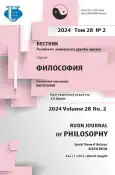The People's Revolution as a Religious and Moral Upheaval: the Influence of the Philosophical Teachings of L.N. Tolstoy on the Artistic Consciousness of A.A. Blok
- Autores: Matveeva I.Y.1
-
Afiliações:
- Russian State Institute of Performing Arts
- Edição: Volume 28, Nº 2 (2024): KANT IN RUSSIA
- Páginas: 467-481
- Seção: HISTORY OF PHILOSOPHY
- URL: https://journal-vniispk.ru/2313-2302/article/view/325429
- DOI: https://doi.org/10.22363/2313-2302-2024-28-2-467-481
- EDN: https://elibrary.ru/UQMIWA
- ID: 325429
Citar
Texto integral
Resumo
The research examines the transformation of the artistic worldview of A.A. Blok from the aesthetics of symbolism and “pure art” to the acceptance of people’s truth and understanding of the need to express the aspirations of the people, clearly manifested in the revolutionary events of the early 20th century. It is shown that this happened largely under the influence of the late philosophical works of L.N. Tolstoy. The research proves that the key images of Blok’s work during the revolutionary period go back to Tolstoy’s late literary works, primarily to the novel “Resurrection”. Tolstoy, in his last novel of the 19th century, exposed the inconsistency of the existing way of life and decisively destroyed the illusion of the possibility of a just structure of society outside the divine law of compassionate love. At the same time, Tolstoy recognized the need for a radical change in society, but understood this change not as a political act, not as a social transformation, but as a deep religious and moral upheaval that changed the entire way of life of the people. Following Tolstoy, Blok believes that this upheaval is completely analogous to the transformation of life that took place during the birth of Christianity and was caused by the advent of Jesus Christ. That is why the image of Christ and reflections on this image become important for Blok’s work of the revolutionary era. The New Christ, about whom Blok is thinking, must become the initiator, the “leader” of a religious upheaval, but only the people can be its driving force. This idea was expressed in the poem “The Twelve,” in the finale of which Jesus Christ walks at the head of a detachment of Red Army soldiers. In Blok’s work after 1905, the chamber and intimacy of his artistic space are finally overcome, the lyrical hero discovers a wide world full of drama and contradictions. The image of a suffering people walking along their Calvary path and ready for revolution becomes central to the poet’s work, and it is certainly inspired by images characteristic of Tolstoy’s late work.
Sobre autores
Inga Matveeva
Russian State Institute of Performing Arts
Autor responsável pela correspondência
Email: inga.matveeva.spb@mail.ru
ORCID ID: 0000-0003-2211-2188
Código SPIN: 2983-9634
PhD in Philosophy, Associate Professor, Department of Literature and Art
33-35 Mokhovaya St., 191028, Saint Petersburg, Russian FederationBibliografia
- Mints ZG. Al. Blok and L.N. Tolstoy. In: Scientific notes of Tartu State University. Works on Russian and Slavic philology. 1962. N V. P. 232–278. (In Russian).
- Sarychev VA. L. Tolstoy in the creative consciousness of A. Blok. Tolstoy Yearbook. 2002. 2003:472—480. (In Russian).
- Blok AA. Autobiography. 1915. Diaries. 1901–1921. In: Collected works in 8 vol. Vol. 7. Moscow, Leningrad: State Publishing House of Fiction; 1963. P. 7–16. (In Russian).
- Blok AA. Letters from A. Blok. Monuments of literary life. Leningrad: Academia publ.; 1927. (In Russian).
- Bely A, Blok AA. Correspondence. 1903–1919. Moscow: Progress-Pleyada publ.; 2001. (In Russian).
- Blok AA. Prose (1908–1916). In: Complete works and letters in 20 vol. Vol. 8. Moscow: Nauka publ.; 2010. P. 53–55. (In Russian).
- Evlampiev II, Matveeva IYu. The debates on the sense of history between F.M. Dostoevsky and L.N. Tolstoy and the idea of “spiritual empire” as a form of historical development of the mankind. Vestnik of Saint Petersburg University. Philosophy and Conflict Studies. 2022;38(3):319–331.
- Blok AA. Letters. 1898–1921. In: Collected works in 8 vol. Vol. 8. Moscow, Leningrad: State Publishing House of Fiction; 1963. (In Russian).
- Blok AA. Notebooks. 1901–1920. Moscow: Fiction publ.; 1965. (In Russian).
- Blok AA. Prose (1903–1907). In: Complete works and letters in 20 vol. Vol. 7. Moscow: Nauka publ.; 2003. P. 83–100. (In Russian).
- Akhmatova А. About Blok. In: Alexander Blok in the memoirs of his contemporaries in 2 vol. Vol. 2. Moscow: Khudozhestvennaya literatura publ.; 1980. P. 94–96. (In Russian).
- Blok AA. Prose. 1918–1921. In: Collected works in 8 vol. Vol. 6. Moscow, Leningrad: State Publishing House of Fiction publ.; 1962. P. 9–20. (In Russian).
- Blok AA. Verses and poems. 1917–1921. In: Complete works and letters in 20 vol. Vol. 5. Moscow: Nauka publ.; 1999. P. 7–20. (In Russian).
- Nagina KA. Blizzard spaces of Russian literature (XIX — early XX century). Voronezh: Nauka-Unipress publ.; 2011. (In Russian).
- Chaaadev PYa. Philosophical letters. In: Complete works and selected letters in 2 vol. Moscow: Nauka publ.; 1991. Vol. 1. P. 320–440. (In Russian).
- Herzen AI. To an old comrade. In: Collected works in 9 vol. Vol. 8. Moscow: Khudozhestvennaya literatura publ.; 1958. P. 399–418. (In Russian).
- Evlampiev II. “The inevitable moral revolution” and the idea of revolution in Russian socio-political thought of the 19th — early 20th centuries. Solovyov studies. 2023;3(79):24–39. (In Russian).
- Tolstoy LN. End of the century. In: Complete works in 90 vol. Vol. 36. Moscow, Leningrad: Khudozhestvennaya literatura publ.; 1936. P. 231—277. (In Russian).
- Blok AA. Poems (1907–1816). In: Complete works and letters in 20 vol. Vol. 3. Moscow: Nauka publ.; 1997. P. 176—178. (In Russian).
- Stroganov MV. Tolstoy’s beginning in the late Blok // Alexander Blok and world culture. Materials of the scientific conference. March 14–17, 2000. Veliky Novgorod; 2000. P. 207—215. (In Russian).
- Tolstoy LN. Resurrection. In: Complete works in 90 vol. Vol. 32. Moscow: Khudozhestvennaya literatura publ.; 1936. P. 1–445. (In Russian).
- Blok AA. Poems (1904–1908). In: Complete works and letters in 20 vol. Vol. 2. Moscow: Nauka publ.; 1997. P. 120. (In Russian).
- Berdyaev NA. Origins and meaning of Russian communism. Paris: YMKA-Press; 1955. (In Russian).
Arquivos suplementares









